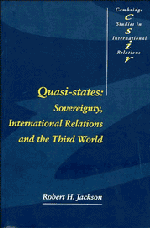Book contents
- Frontmatter
- Contents
- Acknowledgements
- INTRODUCTION
- 1 STATES AND QUASI-STATES
- 2 A NEW SOVEREIGNTY REGIME
- 3 SOVEREIGNTY REGIMES IN HISTORY
- 4 INDEPENDENCE BY RIGHT
- 5 SOVEREIGNTY AND DEVELOPMENT
- 6 SOVEREIGN RIGHTS VERSUS HUMAN RIGHTS
- 7 QUASI-STATES AND INTERNATIONAL THEORY
- CONCLUSION
- Notes
- Index
- CAMBRIDGE STUDIES IN INTERNATIONAL RELATIONS
1 - STATES AND QUASI-STATES
Published online by Cambridge University Press: 01 June 2011
- Frontmatter
- Contents
- Acknowledgements
- INTRODUCTION
- 1 STATES AND QUASI-STATES
- 2 A NEW SOVEREIGNTY REGIME
- 3 SOVEREIGNTY REGIMES IN HISTORY
- 4 INDEPENDENCE BY RIGHT
- 5 SOVEREIGNTY AND DEVELOPMENT
- 6 SOVEREIGN RIGHTS VERSUS HUMAN RIGHTS
- 7 QUASI-STATES AND INTERNATIONAL THEORY
- CONCLUSION
- Notes
- Index
- CAMBRIDGE STUDIES IN INTERNATIONAL RELATIONS
Summary
PROLOGUE
Let us begin with a brief imaginary journey in our time machine and interview a man in the street in 1936. Suppose he is an Englishman and it is Lower Regent Street, London, in the heart of the British Empire. As it happens, he is a career civil servant in a senior position at the Colonial Office. We introduce ourselves as historians from the late twentieth century and ask for an interview. Fortunately, he is used to eccentrics and immediately agrees.
The conversation comes round to the British Empire. He enquires how it is doing. We say it no longer exists. Obviously taken aback, he asks what happened to it. We reply that it was wound down in the fifties and sixties. He evidently has some difficulty believing this and asks what became of the numerous colonies in Asia, Africa, and Oceania? We tell him that colonialism came into disrepute during and after a second world war against Germany and Japan from which the United States and the Soviet Union emerged as rival superpowers. Britain's colonies and also those of France, Holland, Belgium, Portugal, and all other overseas imperial powers had subsequently become independent states.
He asks how it was possible to decolonize so soon throughout the world? We reply that it was relatively easy: by transferring sovereignty to indigenous politicians. He persists in wanting to know how independence could be granted to so many different colonial peoples at various stages of development.
- Type
- Chapter
- Information
- Quasi-StatesSovereignty, International Relations and the Third World, pp. 13 - 31Publisher: Cambridge University PressPrint publication year: 1991
- 1
- Cited by



